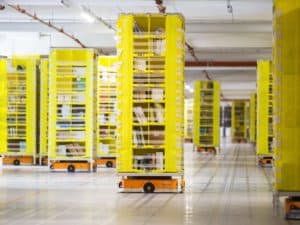
Robots move products around an Amazon warehouse.
Credit: Giulio Napolitano/Getty
There’s no doubt technology is shaking up the American workplace. Amazon employs more than 100,000 robots in its US warehouses, alongside more than 125,000 human workers. Sears and Brookstone, icons of brick and mortar retailing, are both bankrupt. But as machines and software get ever smarter, how many more workers will they displace, and which ones?
Economists who study employment have pushed backagainst recent predictions by Silicon Valley soothsayers like Elon Musk of an imminent tidal wave of algorithmic unemployment. The evidence indicates US workers will instead be lapped by the gentler swells of a gradual revolution, in which jobs are transformed piecemeal as machines grow more capable. Now a new study predicts that young, Hispanic, and black workers will be most affected by that creeping disruption. Men will suffer more changes to their work than women.
The analysis, from the Brookings Institution, suggests that just as the dividends of recent economic growth have been distributed unevenly, so too will the disruptive […]











People cling to straws saying I’m safe, it can’t happen to me. The truth is everyone is in danger of job loss. It’s not just factory workers and retail clerks, highly trained professionals like lawyers and medical doctors have already started losing ground. Even cultural creatives are being affected
The ripple effects of collapsing consumer purchasing power is also not being weighed as each capitalist business activist only thinks of getting as much as they can now when the getting is good.
When societal pressures reach a breaking point even our leaders (who are doing nothing to ease the blow of this advance in technology) will be stunned that they are replaced as the people rise